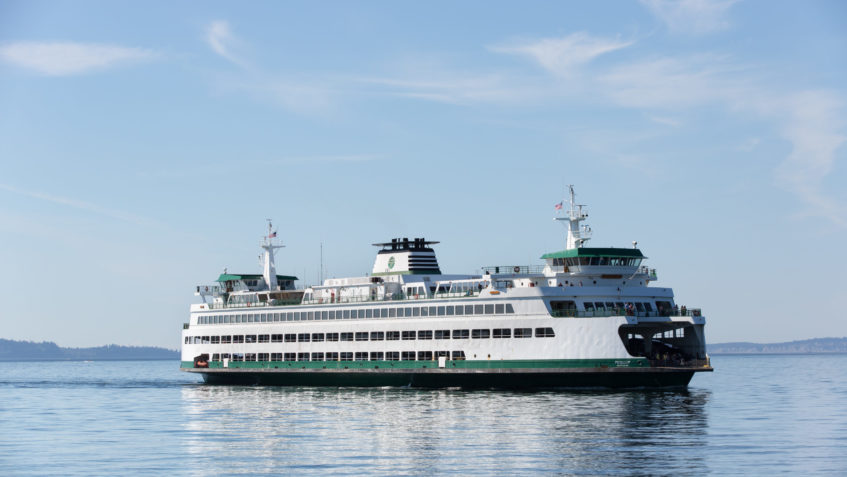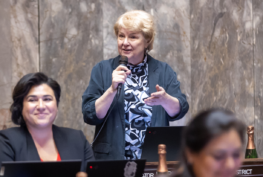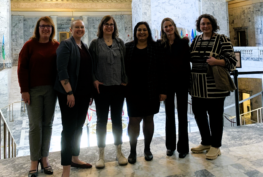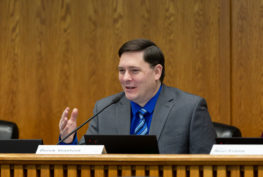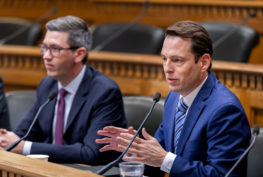The Senate on Wednesday passed House Bill 1125, the 2023-25 transportation budget. The $12.9 billion plan invests in traffic safety, expands the state patrol and ferry workforces, funds green transportation options, and keeps work on schedule for transportation projects big and small across Washington.
The bill passed the Senate 42-6.
The Senate amended its own transportation budget proposal, Senate Bill 5162, onto the House’s version of the budget which passed the House on April 3. Now work will begin between transportation leads in the Senate and House to work out differences between the two budgets.
Senate Transportation Chair Marko Liias (D-Everett) is confident the two chambers will be able to come to a consensus because of a shared vision of Washington’s transportation future.
“We share the same values: safety, green infrastructure and a commitment to continuing work on critical projects in every corner of our state,” Liias said. “There are far more similarities than there are differences so I’m confident we’ll be able to accomplish these shared goals in a way that will move Washington forward.”
Safety is at the center of every transportation decision, and this budget doubles down on that promise. With traffic fatalities at a 30-year high, a renewed emphasis on safety was a goal of the 2023 legislative session. Safety investments in this budget include:
- increasing safe routes to school
- mapping sidewalk gaps
- improving busy intersections
- introducing grade separation on rural roads to prevent serious crashes from lane departures
- directing the Traffic Safety Commission to study and respond to alarming safety trends addressing the section of Pacific Avenue at 134th St. in Parkland that led to the death of 13-year-old Michael Weilert, who was struck and killed while riding his bike at a crosswalk at that intersection in July 2022
The Senate’s safety agenda also includes investments to address the workforce shortage at the Washington State Patrol. Steps are being taken to offer bonuses, recruit already experienced officers to the force through the WSP lateral academy, and diversify the WSP through renewed efforts to recruit and retain women and people of color.
A new funding source this year for transportation comes from Climate Commitment Act auctions. Approximately $830 million in investments in green projects are made in this budget — $758 million of which comes from CCA auctions. Those projects include increasing safe routes to schools, e-bike and school-based bike programs, ferry electrification, and ultra-high-speed rail.
This budget also ensures that large transportation projects already underway continue to progress. Projects like the North Spokane Corridor, Highway 18, and Puget Sound Gateway (a critical connection that completes two critical missing links in Washington state’s highway and freight network) continue forward. Similarly, this budget continues our state’s commitment to put $1 billion toward replacing the I-5 bridge over the Columbia River.
A focus on Washington’s ferry system is also at the core of this budget. That includes procurement of new ferries — including hybrid-electric vessels — in a timely manner, as well as addressing workforce shortages by empowering more diverse communities to seek out those careers.
Related legislation passed off the Senate floor on Wednesday includes:
- SB 5763, which increases existing bond authority for projects included in the 2015 Connecting Washington transportation package
- SB 5742, sponsored by Sen. Claudia Kauffman (D-Kent), a bill to increase transparency by codifying transportation programs that benefit rideshare, special needs and bike and pedestrian grant programs, as well as freight rail safety and assistance programs
- SB 5765, which authorizes tolling on the I-5 bridge across the Columbia River, a necessary step that Oregon has already taken in order to apply for federal funding to help with the eventual replacement of the aging bridge
Negotiations between the two chambers on the transportation budget are expected to begin Monday, April 10. The 105-day 2023 legislative session is scheduled to adjourn on April 23.

